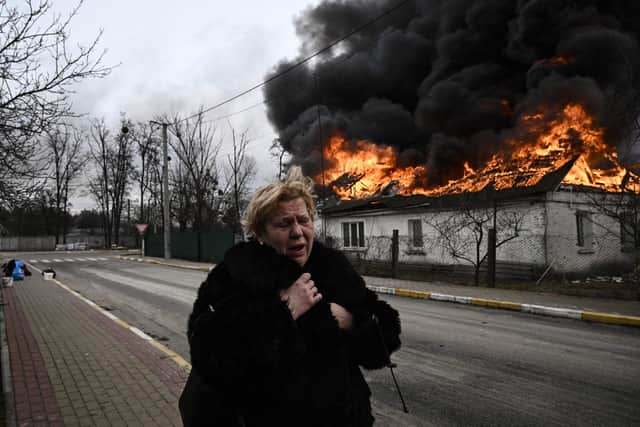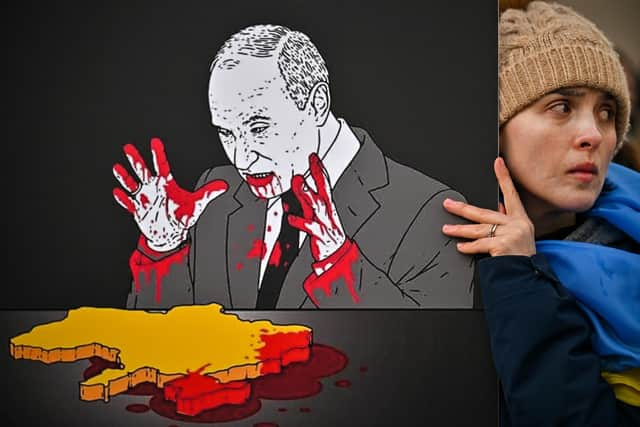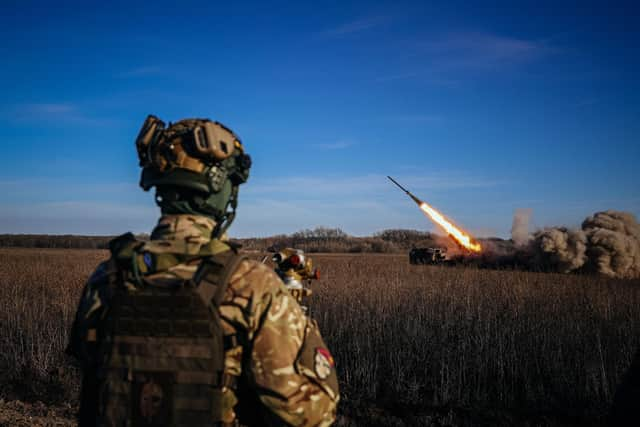Russia's war on Ukraine: United Nations must suspend Russia or it may suffer same fate as League of Nations – Lesia Vasylenko MP, Alyona Shkrum MP and Dmytro Natalukha MP
As Geraldine Byrne Nason, the Irish ambassador to the UN, called for Russia “to step back from the dangerous line and return to diplomacy", the first explosions rang out in Kyiv. Russia launched its full-scale invasion of Ukraine during that very Security Council meeting. World diplomacy has never looked more pitiful and helpless than at that moment. A war broke out in the heart of Europe, but the world community were mere looky-loos.
In the weeks that followed, the world learnt a lot about the strengths and weaknesses of the institutions that were supposed to prevent war and deter aggression. Russia's international isolation – although partial – has become unprecedented in scope. But even after a year of bloody war in Ukraine, some doors remain open to Russia.
Advertisement
Hide AdAdvertisement
Hide AdWith lightning speed, Russia became the uncontested leader in terms of the sanctions imposed upon it, surpassing Iran, Syria and North Korea combined. Most democracies made a point of limiting ‘business as usual’ with Moscow. Visa bans, arrested assets, mass pull-outs of Western companies from Russian markets, and oil and gas embargoes were some of the measures gradually introduced in response to Russia’s atrocities in Ukraine. Collective measures from international organisations followed.
During an extraordinary session of the Parliamentary Assembly of the Council of Europe (Pace), 216 delegates from 46 countries voted to expel Russia from the organisation. Only three people abstained. On March 16, the Committee of Ministers supported this resolution with its own decision.
Since, the Pace has been setting the stage for international decisions which recognise that the Russian regime is a terrorist one, calling on governments to provide air defence systems to Ukraine, imposing sanctions against Russian political parties, questioning its UN Security Council membership, and arguing that Russia has an obligation to compensate Ukraine for all losses inflicted by the military aggression. Russia then lost its seat on the UN Human Rights Council – 93 countries voted to expel Russia, putting it on a par with Muammar Gaddafi's Libya, the only country to have been previously subjected to such a sanction.
There have also been attempts to weaken Russia's influence in the oldest international organisation, the Inter-Parliamentary Union (IPU). Although the charter of that organisation stipulates only one condition for expulsion – non-payment of membership fees – in October 2022 the IPU publicly condemned the annexation of Ukrainian territories. This unprecedented step was made possible primarily by countries in Africa and Central America, where Russia has historically held a strong position.
Russia also lost its place on the council of the International Civil Aviation Organisation and was also suspended from its membership in the United Nations World Tourism Organisation. Finally, Russia was expelled from the Council of the Baltic Sea States.


In absolute terms, by the end of 2022, Russia had lost its membership of 28 international organisations. In addition, the Organisation for Economic Co-operation and Development (OECD) has terminated negotiations on Russia's accession.
Unconfident Nations
However, a suspension of Russia’s membership appears to remain taboo. Despite the fact Russia uses its UN Security Council veto power as a license to kill, Russia is still a member of the UN. It is not just abusing its veto power, which incidentally it has used more often than all other Security Council members combined, Russia is using it completely illegally. A seat on the UN Security Council is officially reserved for the Soviet Union, but not Russia.
Russia's presence in the UN and title to permanent membership in the Security Council is based on the doctrine of continuity of the USSR, a claim absolutely ungrounded from a legal perspective. Here is why.


Advertisement
Hide AdAdvertisement
Hide AdThe Soviet Union completely ceased to exist as a state and as a subject of international law on December 26, 1991. Therefore, Russia’s claim of “continuation” is completely unsubstantiated. As a new state, the Russian Federation was required under Article four of the UN Charter to apply for membership, while the General Assembly had to decide by vote on this application. Instead, Russia just changed desk plates in an arbitrary and flagrant violation of the UN rules.
Thus, Russia’s presence in the UN results from a chaotic swindle, a lack of political will to speak up against barely concealed neglect for the rules. Russia’s presence in the UN remains an exception from the UN rules, an unacceptable situation eroding the organisation’s integrity. Tolerance for violations of procedure has turned into tolerance for violations of substance, with the UN becoming ineffective and completely blocked by Russia’s abuse of the right to veto.
Setting the record straight
Ukrainian President Volodymyr Zelenskyy has said, loud and clear, that Russia’s occupation of the UN Security Council must end. This message was echoed and further developed by the international #unrussiaUN campaign. Launched by Ukrainians who work for UN organisations around the world, civil rights activists, and Ukrainian politicians, the campaign has gathered more than 300,000 votes on change.org and massive social media coverage.


Yet, there is much work to be done before we can see the UN free to function properly as peacekeeping organisation. The biggest challenge lies in the mobilisation of political will. Mistakes were made in the past, as rules were overlooked to keep political alliances. These exceptions led one country to believe it could get away with more exceptions. This led to war, human lives lost and an overall deterioration of international security.
The challenge before world leaders now is to acknowledge and correct the mistakes of the past. The challenge is amplified by a fear, connected to the potential collapse of world order, of the consequences if Russia is truly isolated from all international platforms.
However, it is time to look truth in the eye. If Russia continues to exploit the UN, ignoring its rules and values, the international security framework will continue collapsing into the abyss. But once Russia is suspended from not just the Security Council but the UN itself – as a consequence of the aggressive war it is waging and the international laws it is breeching – then world order stands a chance.
There’s nothing new about these basic truths. History has already taught humanity the very same lesson a century ago with the collapse of the League of Nations. Appeasement of a dictator did not work then and it’s not working now.
One of the sanctions for waging wars of aggression must be the isolation of the aggressor from all international platforms. This especially includes the UN. In the case of Russia, this isolation will be more than just and fair. It will be about bringing the United Nations back to its own rule-based order.
Lesia Vasylenko, Alyona Shkrum and Dmytro Natalukha are Ukrainian MPs for, respectively, the Holos party, the Motherland party and the Servant of the People party
Comments
Want to join the conversation? Please or to comment on this article.